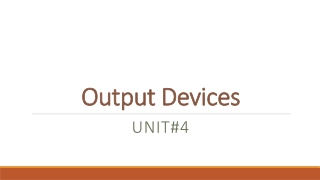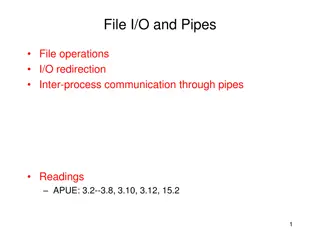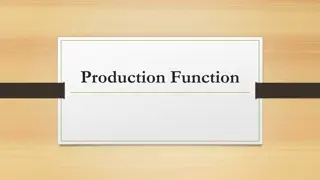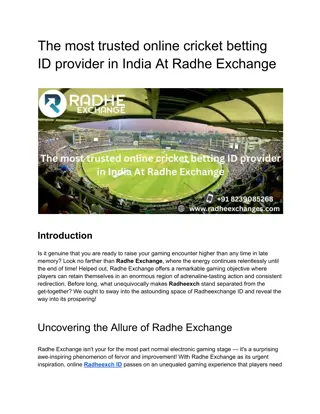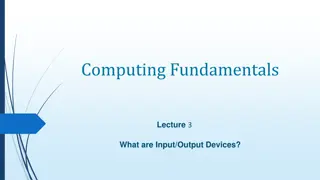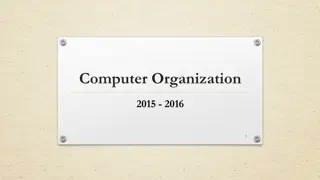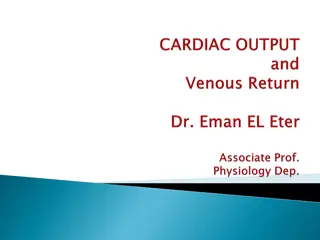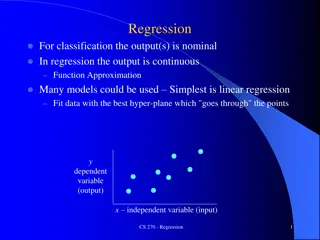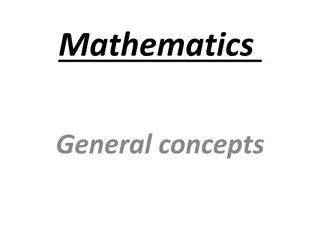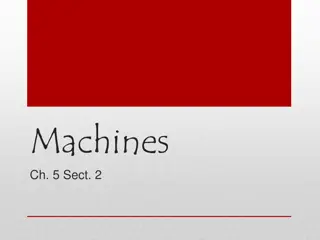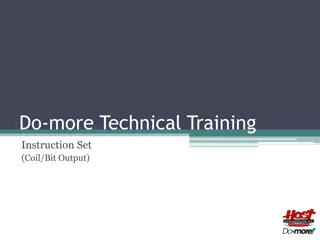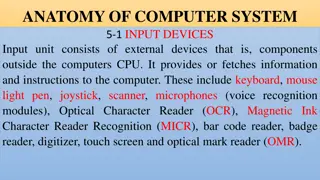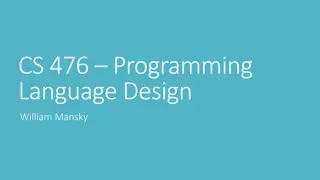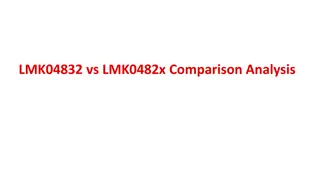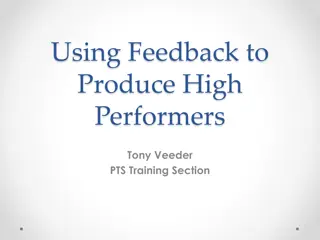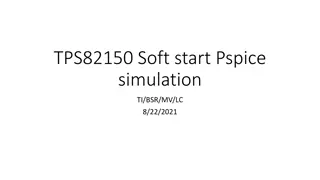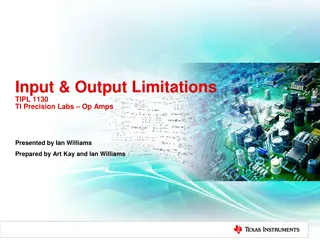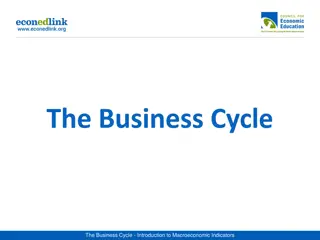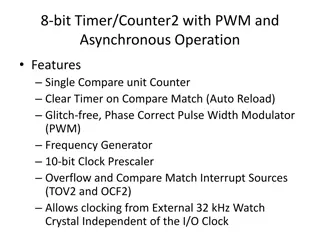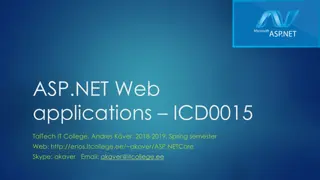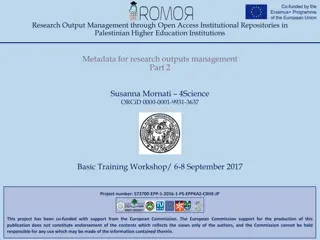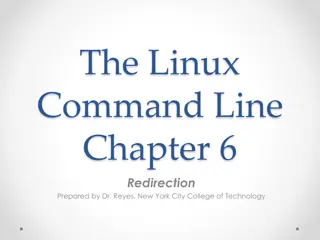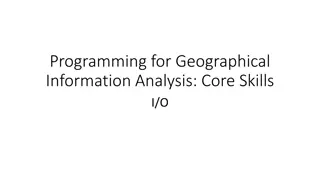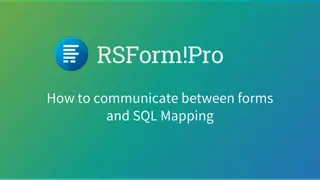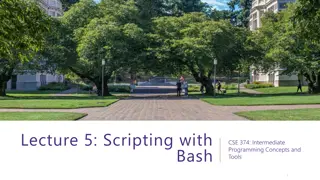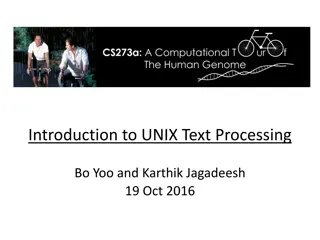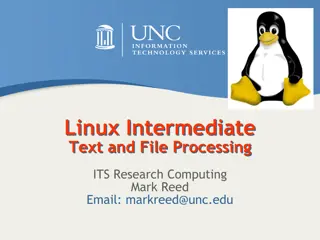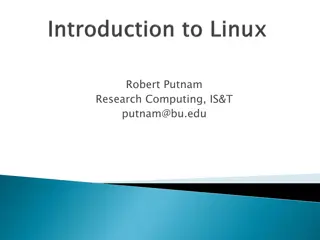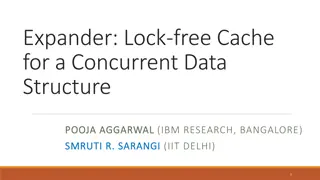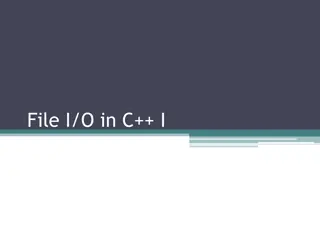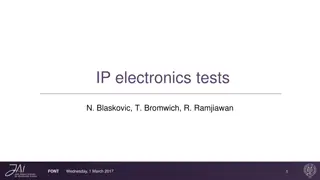Output Devices UNIT#4
Output devices in computing play a crucial role in displaying visual information to users. Monitors, including CRT, LCD, and LED types, provide visual output by showing pictorial forms on screens. Each type has distinct characteristics and resolutions. Graphics adapters help computers render graphic
1 views • 82 slides
Understanding Input-Output Models in Economics
Input-Output models, pioneered by Wassily Leontief, depict inter-industry relationships within an economy. These models analyze the dependencies between different sectors and have been utilized for studying agricultural production distribution, economic development planning, and impact analysis of i
8 views • 7 slides
Understanding File I/O and Inter-Process Communication Through Pipes
Delve into the intricacies of file operations, I/O redirection, and inter-process communication through pipes as discussed in the readings of "Advanced Programming in the Unix Environment" (APUE). Explore data structures for open files, file descriptor tables, implications of data structures, system
4 views • 18 slides
Understanding the Production Function in Economics
The production function is a vital mathematical equation that determines the relationship between factors of production and the quantity of output. This function plays a crucial role in optimizing production efficiency by assisting in decision-making related to input levels, output quantities, and c
0 views • 9 slides
The most trusted online cricket betting ID provider in India At Radhe Exchange
Is it genuine that you are ready to raise your gaming encounter higher than any time in late memory? Look no farther than Radhe Exchange, where the energy continues relentlessly until the end of time! Helped out, Radhe Exchange offers a remarkable gaming objective where players can retain themselves
1 views • 3 slides
Understanding Input and Output Devices in Computing
In computing, input and output devices play a crucial role in enabling communication between users and computers. Input devices are used to enter data into a computer, while output devices display or provide the results of processed information. Common input devices include keyboards, mice, and joys
0 views • 17 slides
Understanding Basic Input/Output Operations in Computer Organization
Basic Input/Output Operations are essential functions in computer systems that involve transferring data between processors and external devices like keyboards and displays. This task requires synchronization mechanisms due to differences in processing speeds. The process involves reading characters
0 views • 11 slides
Understanding Cardiac Output and Venous Return in Cardiovascular Physiology
Cardiac output, stroke volume, end-diastolic and end-systolic volumes play vital roles in cardiovascular function. Factors affecting cardiac output include physiological conditions and pathological states like hyperthyroidism and myocardial infarction. Venous return, controlled by mechanisms like Fr
0 views • 27 slides
Understanding Regression in Machine Learning
Regression in machine learning involves fitting data with the best hyper-plane to approximate a continuous output, contrasting with classification where the output is nominal. Linear regression is a common technique for this purpose, aiming to minimize the sum of squared residues. The process involv
1 views • 34 slides
Understanding Functions and Graphs in Mathematics
Functions are a fundamental concept in mathematics used to describe relationships in the real world. They can be represented through equations, graphs, tables, or verbal descriptions. A function maps elements from a domain to a range, where each input has a unique output. The domain encompasses all
0 views • 4 slides
Redirection from A&E to Primary Care: Improving Patient Pathways
Redirection is crucial for optimizing patient care by guiding individuals away from hospitals to more suitable healthcare settings. The process enhances service utilization efficiency and promotes a shift towards prioritizing primary care for patients. This discussion explores redirecting patients f
6 views • 8 slides
Association of Renal and Cerebral Near Infrared Spectroscopy with Low Cardiac Output in Single Ventricle Patients
Near-infrared spectroscopy (NIRS) has been studied in infants after Stage I palliation surgery to assess its association with low cardiac output and adverse outcomes. This retrospective study investigated postoperative cerebral and renal NIRS values in infants with single ventricle physiology. Resul
0 views • 13 slides
Understanding Machines: Work, Forces, and Efficiency
Machines play a vital role in making work easier by increasing force, distance, or changing the direction of applied force. Different types of machines like levers, pulleys, and inclined planes simplify work processes. Understanding input and output forces, as well as input and output work, is essen
1 views • 10 slides
Do-more Technical Training: Coil/Bit Output Instruction Set
Learn how to utilize the Coil/Bit Output Instruction Set in Do-more Technical Training. This set covers various functionalities including Unconditional END, Trailing Edge One-Shot, Output Reflection, Leading Edge One-Shot, Push On/Push Off, and Reset operations. Understand how each instruction works
0 views • 11 slides
Overview of Computer Input and Output Devices
Input devices of a computer system consist of external components like keyboard, mouse, light pen, joystick, scanner, microphone, and more, that provide information and instructions to the computer. On the other hand, output devices transfer information from the computer's CPU to the user through de
0 views • 11 slides
Understanding Input and Output in Programming: A Comprehensive Guide
This content provides detailed explanations and examples on input and output handling in programming, focusing on concepts such as I/O as State, typed output, and consuming input lists. It covers topics like using print statements, scanning inputs, and building output lists in programming languages.
0 views • 44 slides
Comparison Analysis of LMK04832 vs LMK0482x
General specifications comparison between LMK04832, LMK04828, LMK04821, and LMK04826 including parameters like VCO frequency range, maximum output frequency, input frequencies, PLL specifications, supply voltage, operating temperature, and output formats. Clock output formats, dividers, and delays d
0 views • 5 slides
Psychological First Aid: Supporting Individuals Through Crisis
Psychological First Aid (PFA) is a compassionate intervention aimed at stabilizing acute distress and facilitating continued care after a crisis. PFA focuses on meeting basic needs, stabilizing reactions, fostering resilience, and providing emotional support. Key components include comfort, protecti
0 views • 16 slides
Effective Feedback Strategies for High Performance
Feedback plays a crucial role in helping individuals improve performance and reach their full potential. From providing helpful feedback to reinforcing desired behaviors, this guide explores various strategies, including redirection, reinforcement, and F.A.S.T. feedback, to enhance workplace perform
0 views • 21 slides
Soft Start Simulation Results for TPS82150 Power Module
Results of soft start simulations for TPS82150 power module show that the rise time for output voltage slightly exceeds the expected soft start time due to voltage ramping up to 0.8V only. Different scenarios for input voltage and output current levels are explored, highlighting the impact on rise t
0 views • 4 slides
Understanding Op-Amp Output Swing Limitations in Linear Applications
Explore the limitations of op-amp output swing in linear applications, focusing on the non-linear behavior when driven into saturation. Learn how open-loop voltage gain affects output swing and the implications of operating closer to the rails. Check datasheet specifications for op-amp constraints a
0 views • 5 slides
Understanding Input and Output Limitations in Op Amps
Explore the various input and output limitations in TI Precision Labs Op Amps as presented by Ian Williams and prepared by Art Kay and Ian Williams. Delve into common mode voltage, voltage swing, data sheet parameters translation, input and output stages, examples of common mode voltage, and potenti
0 views • 15 slides
Understanding the Business Cycle in Macroeconomics
The business cycle refers to the fluctuations in an economy, with phases like peak, expansionary, trough, and contractionary. During expansionary phases, output increases, unemployment decreases, and inflation may rise. Conversely, contractionary phases see output decline, unemployment rise, and red
0 views • 6 slides
Maximizing Emergency Department Patient Flow and Addressing Patient Satisfaction in Panel Discussion
Expert panelists discuss strategies for enhancing patient throughput and satisfaction in emergency departments, covering topics such as care on arrival, low-acuity patient redirection, front-end operational changes, and simulation modeling of ED operations. The discussion also delves into drivers af
0 views • 14 slides
CMIP6 Output Requests and Atmosphere/Land Fields Overview
This presentation deck outlines the CMIP6 output request presented at ACME All-Hands meeting in June 2017. It includes detailed information on various atmosphere and land fields that are both part of and not part of the ACME output, covering parameters like radiation, moisture, carbon flux, and vege
0 views • 8 slides
Understanding Timing Models in Cell Design Environments
Delve into the intricacies of timing models for cells in design environments, exploring factors affecting delay, output transitions, linear and non-linear models, and the use of table models in cell libraries to specify delays and timing checks. Discover how input transitions and output capacitance
0 views • 11 slides
8-bit Timer/Counter2 with PWM and Asynchronous Operation
The 8-bit Timer/Counter2 with PWM and Asynchronous Operation features single compare unit, glitch-free operation, phase-correct PWM, frequency generator, clock prescaler, interrupt sources, and external clocking options. It includes registers for control, counter, output compare, asynchronous status
0 views • 14 slides
Overview of HTTP Protocols and Response Codes
Exploring the basics of HTTP protocols and response codes, including details on HTTP GET and POST methods, along with examples of request and response structures. An in-depth look at various status codes and their meanings, such as informational, success, redirection, client errors, and server error
0 views • 12 slides
Research Output Management in PS Higher Education: FAIR Metadata Principles
Research output management in higher education focuses on making scholarly output findable, accessible, interoperable, and reusable through the implementation of FAIR metadata principles. The digital ecosystem surrounding scholarly publications faces barriers like fragmented repositories, varied app
0 views • 22 slides
Comprehensive Guide to Redirection, Pipelines, and Patterns in Linux Command Line
This comprehensive guide covers the use of redirection, pipelines, filters, and patterns in the Linux command line. Learn how to redirect output, use pipelines to pass output between commands, apply filters like sort and uniq, search for patterns using grep, and more. Gain a deeper understanding of
0 views • 7 slides
Geographical Information Analysis Skills: I/O and Data Manipulation Using Python
Python programming for geographical information analysis covers core skills like input/output operations, built-in libraries, data types, and working with files. Learn about standard input/output, redirection of streams, and file manipulation in Python. Explore how to read and write files, interact
0 views • 55 slides
Delving into 2 Samuel 7: Exploring the Eternal Throne and God's Promise
Explore the profound insights of 2 Samuel 7, a pivotal chapter in the Old Testament that unveils God's eternal plan and promise. Journey through David's desire to build a temple, God's redirection of the task to Solomon, and the everlasting covenant established. Witness the divine connection from Da
0 views • 28 slides
Efficient Communication and Data Mapping in RSForm!Pro
Explore how RSForm!Pro facilitates seamless communication between forms and SQL mappings. Learn about pre-filling form data, utilizing specialized URL syntax, and leveraging powerful features like mappings to customize database information without extensive coding. Dive into practical examples such
0 views • 16 slides
Intermediate Bash Scripting for Efficient Command Line Operations
Explore advanced Bash scripting techniques, including file redirection, file transfer methods, and script writing practices. Learn how to compress files, transfer data between local and remote hosts, and create executable Bash scripts for automated tasks in CSE 374.
0 views • 16 slides
Mastering UNIX Text Processing: Tips and Tricks
Explore the world of UNIX text processing through a comprehensive guide covering essential commands, efficient workflows, and powerful combinations. Learn how UNIX commands streamline tasks, eliminate redundant code, and enhance productivity. Discover the art of piping, output redirection, and utili
0 views • 48 slides
Comprehensive Guide on Linux Intermediate Text and File Processing
Explore a detailed course on Linux intermediate text and file processing, covering essential commands, tools, topics, and logistics for post-processing data files. Delve into topics like stdout, stdin, stderr, piping, and redirection. Enhance your skills with practical lab exercises and advance your
0 views • 67 slides
Understanding Linux and Its Importance in Computing
Linux, a Unix clone developed by Linus Torvalds in 1991, is a widely used operating system powering servers, mobile phones, and other devices. It emphasizes the collaborative nature of software development and the synergies between different programs. This overview delves into key aspects of Linux,
1 views • 49 slides
Understanding Lock-Free and Wait-Free Algorithms in Concurrent Data Structures
Illustration of lock-free and wait-free algorithms compared to blocking algorithms, with insights on concurrent object execution, blocking vs. non-blocking algorithms, definitions, comparisons between locks, lock-free, and wait-free approaches, and explanations on making algorithms wait-free. Exampl
0 views • 23 slides
Understanding File Input/Output (I/O) in C++
File Input/Output (I/O) is an essential concept in C++ programming, allowing for interaction with files stored on secondary storage devices. This involves steps like including the fstream header file, declaring file stream variables, associating them with input/output sources, opening the file, perf
0 views • 19 slides
Anomalous IP Processing Electronics Diagnostic Tests
Repeating some anomalous IP processing electronics diagnostic tests on the first stage and the limiter. Tests include checking for unwanted harmonics in the frequency multiplier output and observing changes in the output power with varying input power. Issues with the output of the limiter diode and
0 views • 15 slides
